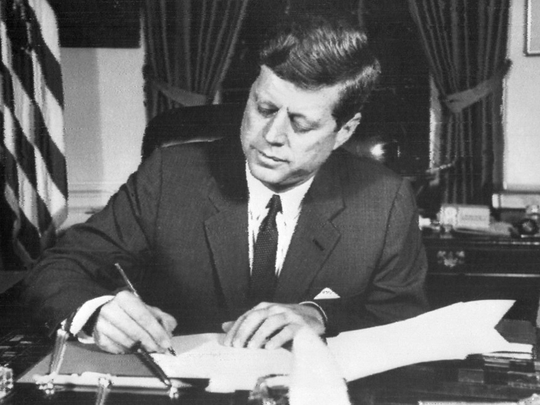
It’s perfectly rational to believe in conspiracies. When something happens that seems impossible, it’s natural to look for a human explanation — and if the CIA can try to kill Fidel Castro with an exploding cigar, or Richard Nixon’s boys can bug the Watergate Hotel, why wouldn’t the KGB shoot John F Kennedy and pin the blame on a chump called Lee Harvey Oswald?
Of all the conspiracies, the one against JFK is the most appealing because the subject was so attractive. United States President Donald Trump knew what he was doing when he allowed 2,800 files to be released on the assassination, a crime that in popular memory brought down the strongest president in an era of the highest ambition. Kennedy pledged to fight Communism and go to the moon. The playwright Tennessee Williams said he was almost “too attractive” to be president.
There was a conspiracy of sorts to hide images of him limping about on crutches, one symptom of many illnesses, which meant that when Oswald shot him dead from the window of the Texas School Book Depository, the public was left with an impression of a virile leader felled by a “magic bullet”. There had to be an element of magic in it because the Kennedys were cursed by bad luck: First Jack assassinated; then Bobby, shot in a hotel pantry; then Ted’s car span off a bridge at Chappaquiddick Island and his female passenger died; then Jack’s son killed in an air plane crash. Coincidence? Can fate really be that cruel? Yes. It can also be perversely kind.
The assassination of JFK pickled his memory in aspic: Black and white photos of a brilliant young man full of potential. Had he lived, however, Kennedy might be remembered as a byword for disappointment. Vietnam would still have happened. The riots would still have happened. Nixon would probably still have won the 1968 election. And in retirement, Kennedy would’ve seen several birds come home to roost, such as his alleged affair with Judith Exner, the mistress of gangster Sam Giancana.
Imagine JFK in the 1970s, frail, divorced, disgraced. If conspirators had wanted to destroy Kennedy’s myth, they’d have let him live. But they didn’t make that choice because, as Trump’s data dump pretty much confirms, there were no conspirators. Just a loser with a gun.
We accept that malice and random events can change our own lives — a thief with a knife or a car that skids out of control — yet we don’t do the same with politics. We ascribe to politicians competences that, God bless them, they just don’t have. The US government can hardly make the trains run on time, let alone fake the moon landings or blow up the twin towers. Of course, by saying that I leave myself open to the charge of being a conspirator myself. And that’s one of the best things about believing in a conspiracy: Even when someone tries to prove you wrong, it just proves you’re right.
— The Telegraph Group Limited, London, 2017
Tim Stanley is an English blogger, journalist and historian.









